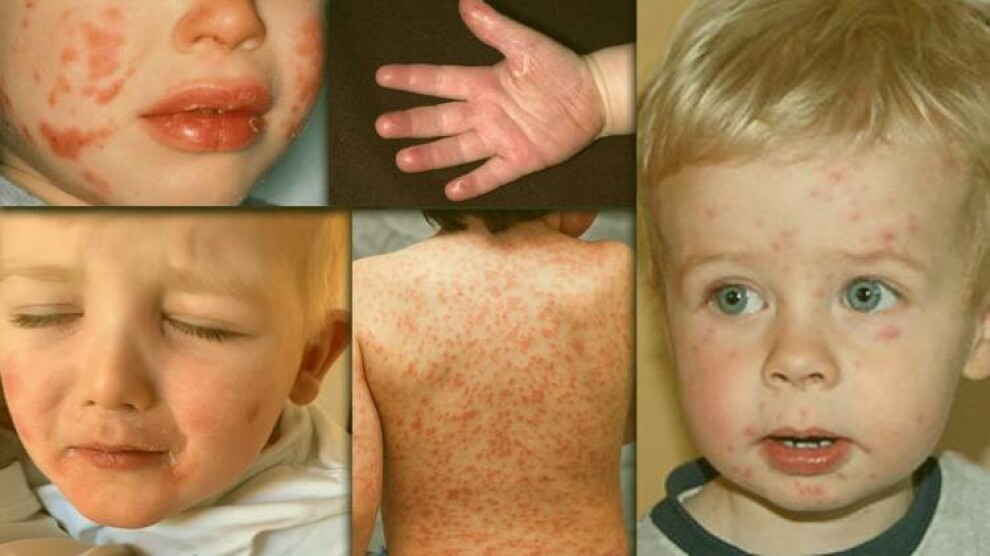Kawasaki disease rarely affects children along with Covid-19

News Center - One of the most common vascular disorders in children, Kawasaki disease is one of the rare diseases that have spread with the Covid-19 pandemic breakout and affected a number of children in Britain, France, Switzerland, the United States, and other countries.
Multisystem Inflammatory Syndrome in Children
According to laboratory and scientific studies reached by a team of doctors, children being infected with the Coronavirus, may cause side effects that negatively affect their lives and they are most likely to be infected with an inflammatory condition similar to the symptoms of "Kawasaki" disease, and a study conducted by a medical team from the University of Birmingham in England revealed that eight children infected with Coronavirus were admitted to Birmingham Hospital in April 2020, suffering from the emergence symptoms of Kawasaki disease.
Kawasaki disease also known as "mucocutaneous lymph node syndrome" is a systemic inflammation that affects small and medium-sized blood vessels, affecting their walls, which may cause arterial expansion, especially the coronary arteries that supply the heart, in addition to affecting many skin organs, lymph nodes, and mucous membranes.
The name PIMS-TS was given to the syndrome that affects children initially and gradually according to its stages, and is an abbreviation for "children's polysystemic inflammatory syndrome" associated with the Coronavirus of the infected child, some doctors, and scientists have diagnosed that antibody tests are the only way to transmit infection in children who suffer from this syndrome, which can be fatal.
According to British doctors, the multisystem inflammatory syndrome for children with Coronavirus is not temporarily related to the Coronavirus, but rather is caused by infection with the virus, doctors can treat the symptoms of Kawasaki disease upon early detection, cases of the syndrome in children were also recently reported, after the outbreak of the Corona epidemic, and it's widespread in the United Kingdom, the United States, France, Italy, Spain, and Switzerland.
Symptoms
Kawasaki patients suffer from symptoms and signs that appear on the child according to the stages of its formation, which can last for up to two weeks, the symptoms of the disease in early stages are including fever for more than five days and a clear rash followed by redness of the fingers and eyes, and after the development stages of formation the disease swells the lymph glands in the neck, and cracks appear on the lips, accompanied by dryness in the mouth and the appearance of red bumps on the tongue, chronic infections in the throat, problems with the digestive system, inflammation of blood vessels, in addition to difficulty breathing.
Symptoms such as abdominal pain, vomiting, diarrhea, and headache often appear in the last stages of the disease, and then disappear despite the lack of energy of the child physically.
Serious complications affecting the heart
The patient can suffer from serious complications that affect the heart and negatively affect his life if it is not detected early and treated medically, such as aneurysms from the coronary arteries that supply blood to the heart, inflammation of the heart muscle, valves and the outer membrane around the heart, arrhythmias, and the presence of problems with some heart valves.
Infectious viruses are one of the reasons
Kawasaki disease, which first appeared in Japan in 1967, affects children under five years old, skin lymphatic affects 8 out of every 100,000 children in the United Kingdom and statistics show that it is fatal in 3% of cases that are not treated.
The causes of the development of the stages of the syndrome after infection with the Coronavirus in children are still unknown but after scientific studies conducted by some doctors and after scientific and laboratory diagnosis, they reached that it may be due to an exaggerated reaction from the body's, that causes damage to the cells themselves.
Aspirin treatment and globulin solution dosages
The syndrome causes inflammation in the walls of the arteries, and it can limit the blood flow to the heart, so it is initially treated with heat by taking a high dose of aspirin and doses of IVIG immunoglobulin are given to treat infections and reduce the frequency of disease complications on the heart.
A high dose of intravenous immune globulin is an essential part of treatment that can reduce the chance of coronary artery anomalies occurring, and for the patient who don’t respond to doses of immune globulin, they are given a high dose of intravenous corticosteroid steroids or treated with biological drugs.
Side effects of the drug therapy
The body often accepts intravenous immune globulin and is safe, and aseptic meningitis rarely occurs, but after taking the doses, the introduction of the "vaccine" vaccinations should be postponed and discussed with the pediatrician who decides to receive them, and an increase in the dose of aspirin may result in nausea or stomach upset. .
The diagnosis
Kawasaki disease is diagnosed with the experience of a specialist doctor on the basis of a clinical evaluation and that is if the high level of fever lasts for five days, in addition to its associated auxiliaries such as inflammation of the lymph nodes or inflammation of the membrane surrounding the eyeball, the emergence of the rash and the impact of the mouth and tongue, and then the doctor should make sure that there is no evidence of another disease that explains the same signs.
Some children may have incomplete forms of the disease, which means that they meet fewer clinical criteria set-in making the diagnosis difficult, at that time the disease will have incomplete symptoms.
Recommendations for prevention
For the sake of protection and prevention, any child must play sports, provide a suitable environment for living, and follow a balanced and appropriate diet for his age that contains adequate amounts of protein, calcium, and vitamins, and patients who take corticosteroids should avoid overeating, as these drugs may increase appetite.
